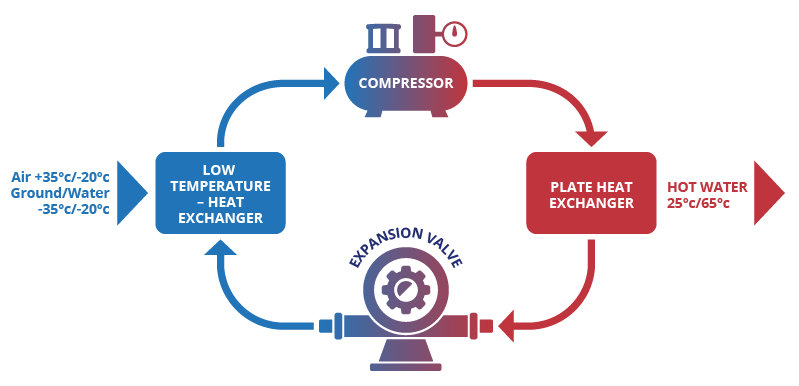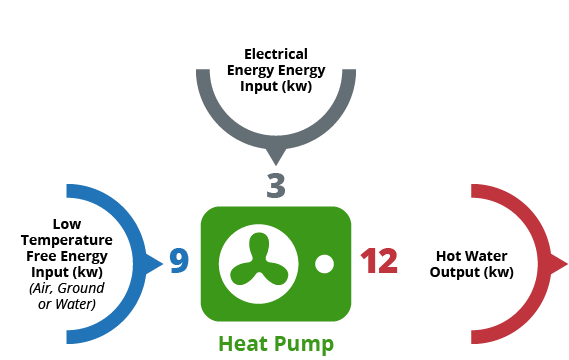FAQs
Frequently Asked Questions
Find below some of the most common questions that arise when talking all things heat pumps.
How do you buy a Heat Pump?
Heat pumps require installation by a trained installer in order to ensure a high level of quality. Please contact an MCS certified installer to get started on the path to decarbonising your home’s heating.
Do I need planning permission to install a heat pump?
In many cases, the installation of a heat pump is considered as permitted development provided certain limitations and conditions are met. If you live in a listed building or a conservation area, then further requirements might apply. The requirements vary in each devolved nation, so it’s best to check with your local planning department before proceeding.
For example, in England when installing air-source heat pumps, the volume of the air source heat pump’s outdoor compressor unit (including housing) must not exceed 0.6 cubic metres. More information for England can be found here. More information for Wales can be found here. More information for Scotland can be found
The installation of a ground source heat pump or a water source heat pump on domestic premises is usually considered to be permitted development, and not needing an application for planning permission. However, it’s best to contact your local council to check here
You should also inform your local district network operator (DNO) prior to installing a heat pump. The DNO is the company responsible for bringing electricity from the network to your home. Your MCS installer can assist you with this and you can find more information in this guidance from the Energy Network Association.
You can find more guidance on registering a heat pump in England, Scotland and Wales on the UK Government website.
How do heat pumps work
A heat pump captures heat from the ambient air, or solar energy stored in the ground or water. Then, using a compression cycle raises this low input temperature to a much higher one, to provide hot water for heating your home.
Electricity is used to carry out this process, the amount used depends on the input temperature, and output flow temperature required. The closer these two temperatures are, the lower the energy required to carry of the operation. Because the system relies on electricity, no carbon is emitted at the point of use.

Heat naturally flows from a warmer place to a colder place. To provide heat to a home when outdoor temperatures are colder, we need heat to flow in the other direction – from a colder to a warmer place.
All heat pumps have a “refrigerant” within the system, in the form of a gas. When the pressure of gas increases, the temperature follows. This relationship between pressure and temperature is key to how heat pumps work.
Heat energy from the air, ground or water is passed through a heat exchanger. This is then absorbed by the refrigerant gas within the heat pump, raising the temperature. The refrigerant is then moved to a compressor, where pressure is applied to create a higher temperature. From here, it passes through to a heat exchanger, where energy is transferred to the primary water flow within the property – delivering hot water to a home.
How efficient are heat pumps?
Heat pumps are more efficient than other heating systems, and use a small amount of electricity to produce a greater amount of heat for the home. Efficiency of heating systems is measured by the Coefficient of Performance (CoP). For example, if a heat pump has a CoP of 3.0, then it will deliver 3 kWh of heat power for every kWh unit of electricity used.
The diagram below shows the theoretical energy flow of a 12-kilowatt (kW) heat pump. In this example, the heat pump has an electrical load of 3kW to generate a heat output of 12kW, and the remaining 9kW are drawn from the environment. To calculate the CoP, you divide the heat output by the electrical input, which in this example results in a CoP of 4.0.

Every heat pump has a published datasheet with its measured CoP. The CoP is measured at a single point in time, with air source heat pumps it is normally when the air is +70C and water leaving the heat pump unit is 350C (A7/W35). However, in real-world-usage, the air or ground temperatures vary throughout the year, which may affect the heat pump efficiency.
What is the Boiler Upgrade Scheme (England & Wales)?
The Boiler Upgrade Scheme is a government grant programme for homes in England and Wales. Vouchers of £7,500 (as of 23rd October 2023) are available towards the installation costs of air and ground/water source heat pumps respectively. More information about eligible properties and how to apply can be found here.
What is the Home Energy Grant (Scotland)?
The Home Energy Grant is government funded support worth around £5,000 available for energy saving home improvements like heating and insulation. More information can be found here
Is my house suitable for a heat pump?
Generally, yes. A recent study found that all housing types are suitable for heat pumps. However, in order to ensure the system runs as efficiently as possible, insulation and radiator upgrades may be required, your installer should be able to advise on this.
.
Do I need to upgrade my radiators?
Heat pumps operate at their most efficient when they distribute a low flow temperature around the heating system. Many domestic properties will already have radiators that are compatible with a heat pump system. In some cases, it may be beneficial to upgrade to larger radiators, in order to run the heat pump as efficiently as possible.
Radiators come in many different shapes and sizes. Often, single panel radiators can be swapped for double or triple panel radiators to increase surface area, without needing to increase the amount of wall area taken up. This can more than triple the heat emitted without taking up more wall space. Radiator upgrades can be a cost-effective way of improving the efficiency of your heat pump and saving on energy bills.
Some wet central heating systems installed in the 1970s have a particular type of piping (called microbore), which has a small internal diameter. This can be problematic when upgrading to a heat pump. The very small pipe diameter means the heat pump cannot transfer water quickly enough to the radiators. If you think you have microbore pipe, speak to your installer when they come to survey your house.
Heat pumps are considered an excellent partner with underfloor heating which works with low flow temperatures. However, retrofitting underfloor heating in existing homes can be practically challenging.
Are heat pumps noisy?
Ultimately, the perceivable noise will depend on the heat pump running conditions, the acoustic environment, and the quality of the external unit.
Ground and water source heat pumps are typically located inside your home in an insulated casing which limits any noise intrusion.
The air source heat pumps outdoor unit typically has sound power levels between 55 – 75 dB(A) depending on the manufacture and output. However, some external units operate as low as 40 decibels. For comparison, this is about the same volume as a quiet library! The running noise from the outside unit of an air source heat pump can be described as a low-level background “hum”. MCS installers are required to carry out a noise assessment prior to installation of an air-source heat pump.
How much do heat pumps cost?
The cost of heat pumps varies according to the heat load of your property, the size of heat pump required to heat the home, the heat pump technology chosen and any additional installation requirements, such as radiator upgrades, that might be needed as part of the install.
Are heat pumps expensive to run /are heat pumps cheaper than gas?
A well-designed efficient heat pump system may offer lower or comparable running costs to a natural gas boiler system. Given that the price of natural gas is expected to rise again in future, heat pumps may provide a degree of shielding against future price fluctuations.
For those currently using oil or LPG fuels to heat their homes, a well-designed heat pump system should save you money over a yearly period, provided the system is installed correctly.
How the operating conditions will affect your energy bill will depend on several factors, including:
- What fuel you are replacing and how much it costs,
- Your electricity tariff,
- Which type of heat pump you install and how efficient it is,
- The design of your central heating system,
- Your location and its average air or ground temperatures throughout the year.
Can heat pumps provide domestic hot water?
Yes! A standard heat pump requires a cylinder to store hot water. The cylinder allows the heat pump to gradually heat the water, and store it for the moment it is needed.
Most heat pumps can provide and store water at 55°C, periodically heating up to 60°C or higher for disinfection purposes. Alternatively, some systems use an immersion heater to top up the water to the required temperature.
Boiler cylinders cannot normally be used with a low temperature heat pump, as the coil within the cylinder is not large enough. Therefore, a heat pump cylinder with an appropriately sized coil is usually recommended to ensure that the required hot water temperature is achieved in the most efficient manner.
Design guide for sizing heat pumps
A heat pump system works harder when there is a larger difference in temperature between the external medium and what is needed in your radiators or underfloor heating. While we can’t control the temperature of the external source, it’s possible to design heating systems that use lower temperature water indoors, using less electricity while still comfortably heating your home.
By using larger radiators, or underfloor heating, more heat can be delivered into the room without increasing the water temperature. Running the heating system for longer is another way of delivering more heat into the room with lower temperature water. This allows for lower running costs than if the system had to run at a higher temperature.
A well-designed system will therefore reduce the heating water temperature as much as possible. A full room-by-room heat loss calculation should be carried out by your installer to ensure the heating system can provide the heat required efficiently. From this the heating requirement of the house will be noted, allowing for the optimum heat pump to be selected and installed.
Do you have an approved supplier register?
A list of independently assessed MCS certified installers can be found here. Note that the HPA does not recommend, endorse or suggest possible heat pump installers.
